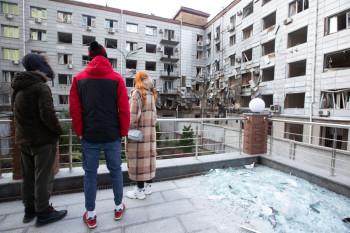Russia doesn’t plan to end its full-scale war against Ukraine but instead prepares to carry out new offensive operations, Defense Ministry’s Intelligence Directorate's spokesman Andrii Cherniak told Ukrainian media.
“They (Russian military) may simultaneously attack from the north or the east. Such actions of the enemy are expected, and our troops are ready for it,” Cherniak told RBK-Ukraine, a Ukrainian news site.
Russian forces's strategy is to hold the land corridor to occupied Crimea and capture the entire Donetsk Oblast, according to Cherniak.
He said that the Russian military would not be able to cross the Dnipro River to retake the city of Kherson, which was liberated by Ukraine’s Armed Forces on Nov. 11.
According to the intelligence’s estimates, the Russian army may lose up to 70,000 more servicemen in the next 4-5 months of fighting.
However, Russia’s leadership is “ready for such losses,” Cherniak added.
"They know they will lose but they aren't planning to end the war," he said.
Valerii Zaluzhnyi, commander-in-chief of Ukraine’s Armed Forces, told the Economist in mid-December that Russia was getting ready for a new attack on Ukraine “as soon as January, but more likely in the spring,” seeking to push back Ukrainian forces and potentially making a second attempt to take Kyiv.
According to Zaluzhnyi, Russia was preparing some 200,000 fresh troops for this offensive.
In his opinion article for the Financial Times, NATO Secretary General Jens Stoltenberg wrote that Kremlin’s “invitations to negotiations” only aim to buy Russia time for regrouping and launching a new attack against Ukraine.










